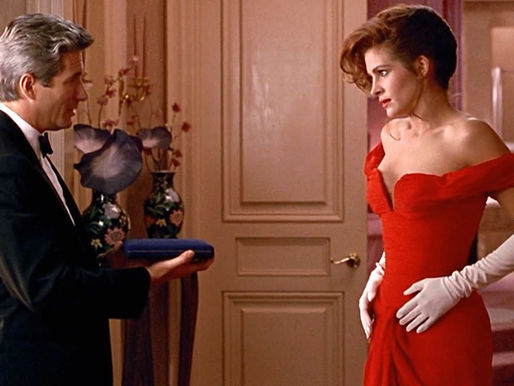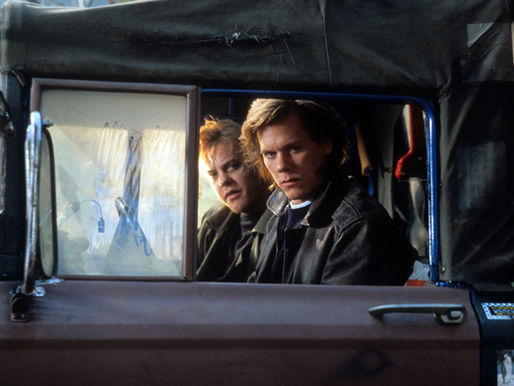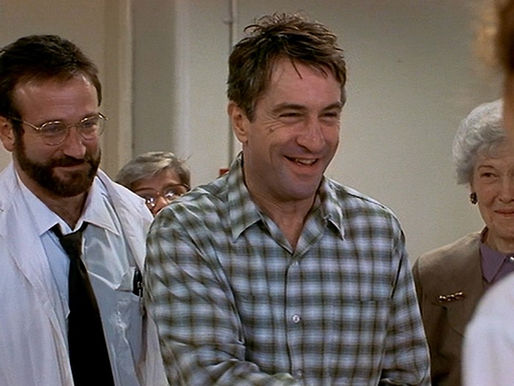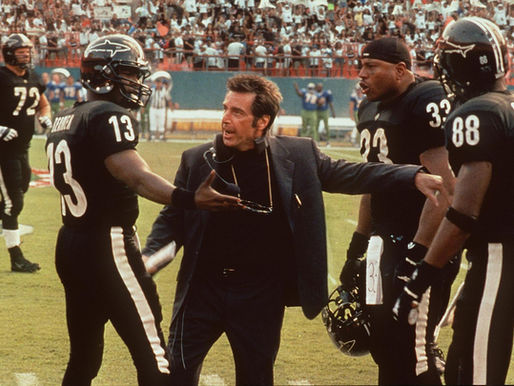top of page
Search
Film Reviews
Reviews of films from 1930's through to 1999.


Pretty Woman (1990)
Garry Marshall’s Pretty Woman is one of the most enduring romantic comedies in Hollywood history, a modern-day Cinderella story that combines charm, humour, and heart. Released in 1990, the film became a cultural phenomenon, launching Julia Roberts to superstardom and re-establishing Richard Gere as a romantic leading man. More than three decades later, Pretty Woman continues to captivate audiences with its winning combination of fairytale romance and 1990s Los Angeles glamou

Soames Inscker
4 min read


Flatliners (1990)
oel Schumacher’s Flatliners is a visually striking and psychologically charged thriller that blends science fiction, horror, and morality play into a unique cinematic experience. Released in 1990, the film stars Kiefer Sutherland, Julia Roberts, Kevin Bacon, William Baldwin, and Oliver Platt as a group of ambitious medical students who dare to flirt with death itself.

Soames Inscker
4 min read


Footloose (1984)
Herbert Ross’s Footloose is one of the defining films of 1980s popular culture—a high-energy mix of music, rebellion, and small-town drama that turned Kevin Bacon into a household name and produced a soundtrack that has become iconic in its own right. Released in 1984, the film blends the coming-of-age genre with the feel of a musical, delivering a story about youth, freedom, and the transformative power of dance.

Soames Inscker
4 min read


Apollo 13 (1995)
Ron Howard’s Apollo 13 is a masterclass in historical drama and technical filmmaking, a gripping retelling of NASA’s 1970 near-tragedy that turned into one of humanity’s greatest survival stories. Released in 1995 and starring Tom Hanks, Kevin Bacon, Bill Paxton, Gary Sinise, and Ed Harris, the film has since become a staple of both the space exploration genre and disaster cinema. It succeeds not only as a tense thriller but also as a deeply human story of courage, teamwork,

Soames Inscker
4 min read


Stir of Echoes (1999)
David Koepp’s Stir of Echoes is a taut, atmospheric supernatural thriller that manages to weave elements of horror, suspense, and psychological drama into an engaging cinematic experience.

Soames Inscker
2 min read


Basic Instinct (1992)
Basic Instinct, directed by Paul Verhoeven and released in 1992, is one of the most provocative and controversial films of the 1990s — a neo-noir erotic thriller that shocked audiences with its explicit sexuality, ambiguous morality, and psychological complexity.

Soames Inscker
4 min read


Being John Malkovich (1999)
Spike Jonze’s Being John Malkovich, released in 1999, is one of the most original, inventive, and surreal films to emerge from American cinema in the 1990s. A bizarre blend of absurdist comedy, philosophical science fiction, and psychological drama, the film marked the feature debut of both Jonze (director) and screenwriter Charlie Kaufman.

Soames Inscker
4 min read


Awakenings (1990)
Awakenings, directed by Penny Marshall and released in 1990, is a deeply moving and quietly powerful film based on the true story of Dr. Oliver Sacks. Adapted from Sacks’ 1973 memoir of the same name, the film explores the fragility and resilience of the human spirit through the lens of medicine, memory, and human connection. It is a story of miraculous awakenings — both literal and metaphorical — and one of the most affecting medical dramas ever brought to the screen.

Soames Inscker
4 min read


Any Given Sunday (1999)
Oliver Stone’s Any Given Sunday is a brash, visceral, and unrelenting dive into the heart of American football — not just the game itself, but the chaotic world that swirls around it. Released in 1999, this sprawling sports drama captures the raw physicality, political undercurrents, and ego-driven dynamics of professional football with a ferocious energy rarely seen in the genre.

Soames Inscker
3 min read


Ronin (1998)
Robert De Niro is in his element here as Sam—cool, competent, and calculating. De Niro plays him with quiet authority, bringing subtlety rather than flash to a character who’s always thinking three steps ahead. It's one of his most understated and convincing performances of the late ’90s, free of ego and all the more effective for it.

Soames Inscker
3 min read


The Godfather Part III (1990)
The Godfather Part III, released in 1990, is one of cinema’s most debated conclusions to a beloved saga. Serving as the epilogue to Francis Ford Coppola’s monumental crime saga, this third entry attempts to tie a definitive bow on the saga of Michael Corleone—a man who sought legitimacy but never escaped the sins of his past.

Soames Inscker
3 min read


A Few Good Men (1992)
Rob Reiner’s A Few Good Men (1992) is a gripping courtroom drama that combines taut legal maneuvering with moral complexity and powerhouse performances. Adapted from Aaron Sorkin’s stage play of the same name, the film crackles with sharp dialogue, simmering tension, and a final act that has become one of the most iconic in modern cinema. More than just a legal thriller, it’s a study in duty, ethics, and the perilous gray areas between following orders and doing what’s right.

Soames Inscker
3 min read


The Madness of King George (1994)
Nicholas Hytner’s The Madness of King George (1994) is a captivating historical drama laced with biting wit, political intrigue, and profound humanity. Adapted by Alan Bennett from his own acclaimed stage play The Madness of George III, the film dramatizes the mental decline of King George III with equal measures of humor and pathos, delivering a sharply observed portrait of monarchy, madness, and the fragile structures of power.

Soames Inscker
3 min read


Titanic (1997)
James Cameron’s Titanic (1997) is a film of staggering ambition, sweeping romance, and unmatched spectacle—a cinematic achievement that turned a historical tragedy into one of the most beloved and successful movies of all time. Merging epic storytelling with emotional intimacy, Titanic is both an old-fashioned romance and a technical marvel, a blockbuster that balances its grandeur with genuine pathos and human depth.

Soames Inscker
4 min read


Crash (1996)
David Cronenberg’s Crash (1996) is one of the most controversial films of the 1990s—a provocative, transgressive, and often disturbing exploration of the intersection between technology, sexuality, and death. Based on J.G. Ballard’s 1973 novel of the same name, Crash is not a film that seeks to comfort or moralize. Instead, it confronts viewers with taboo-breaking ideas and cold, clinical detachment, asking them to look at human desire through a lens that is both erotic and m

Soames Inscker
3 min read


Carlito's Way (1993)
Brian De Palma’s Carlito’s Way (1993) is a stylish, operatic crime drama that blends the director’s signature flair for cinematic bravado with a surprisingly soulful story of redemption. With a powerhouse performance by Al Pacino and a sharp supporting turn from Sean Penn, the film stands as one of the most underrated entries in the gangster genre—a meditation on past sins, impossible dreams, and the gravitational pull of the streets.

Soames Inscker
3 min read


Interview with the Vampire (1994)
Neil Jordan’s Interview with the Vampire is a lush, brooding, and provocative gothic horror film that revitalized the vampire mythos for a new generation. Adapted from Anne Rice’s bestselling 1976 novel, the film offers a moody and philosophical exploration of immortality, moral decay, and loneliness, all wrapped in lavish 18th- and 19th-century decadence. Stylish and atmospheric, it remains one of the most distinctive vampire films ever made.

Soames Inscker
3 min read


Beauty and the Beast (1991)
Walt Disney Pictures’ 1991 animated film Beauty and the Beast is a landmark in cinema—a timeless tale brought to life with exquisite artistry, unforgettable music, and emotional depth that captivated both children and adults alike. Not only did it solidify Disney’s resurgence in the early ’90s, but it also became the first animated film ever to be nominated for the Academy Award for Best Picture, a distinction that speaks to its cinematic excellence and cultural impact.

Soames Inscker
3 min read


Death and the Maiden (1994)
Roman Polanski’s Death and the Maiden is a chilling, psychologically taut drama that unfolds almost entirely in one isolated location, yet grips like a vice. Adapted from Ariel Dorfman’s acclaimed 1991 stage play, the 1994 film plunges into the dark terrain of trauma, justice, and moral ambiguity in a post-dictatorship society. With only three characters and minimal action, it builds unbearable tension through dialogue, silence, and psychological warfare.

Soames Inscker
3 min read


Before Sunrise (1995)
Richard Linklater’s Before Sunrise is a quietly enchanting, deeply intelligent romantic drama that redefined what a love story could be in modern cinema. Released in 1995, the film takes the simplest of premises—a young man and woman meet by chance on a train and spend a single night walking and talking through Vienna—and spins it into something lyrical, philosophical, and emotionally resonant.

Soames Inscker
3 min read
bottom of page


